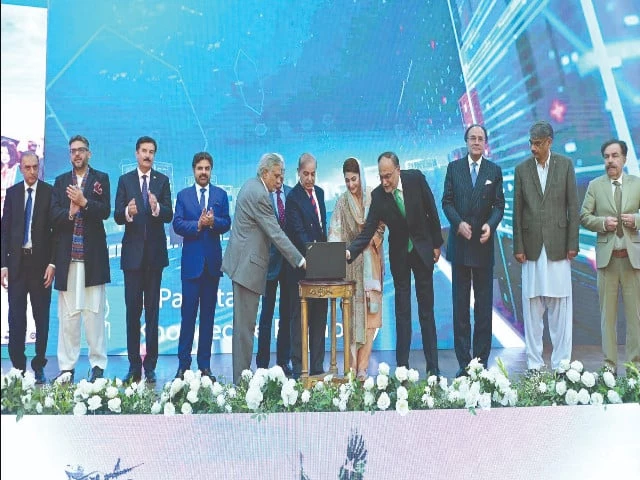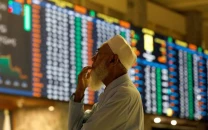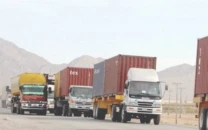Industrialists criticise 'Uraan'
Call for reducing red tape, promoting long-term policies, ensuring transparency

Criticising the five-year plan, industrialists and exporters have urged the government to do away with red-tape culture and instead promote red-carpet treatment for investors, exporters and industrialists. "Bureaucrats are twisting the arms of businessmen with heavy taxes, high energy tariffs and other burdens," they lamented.
Successive governments have pretended to dispel economic woes and generate business opportunities, while hiding behind these so-called programmes for the past two decades. The recently launched five-year national economic transformation plan titled 'Uraan Pakistan', launched by Prime Minister Shehbaz Sharif, is a dead loss, they claimed.
Riazuddin, a leading industrialist and former president of the Site Association of Industry (SAI) said the eighth and last five-year plan ended in 1998. Since then, there has been no sustainable policy. He commented that, "The five-year plan announced by the PM is no better; it fails to set clear directions on crucial economic matters, such as clarity on how expenses will be reduced, how revenue will be enhanced and other factors."
He remarked that the country cannot run without a clear, long and sustainable policy. First, the government must decide if Pakistan is primarily an industrial, agriculture or IT-driven economy so that the right direction can be set, Riazuddin said.
He added that increasing exports requires competitiveness, productivity and innovation, none of which the country possesses due to poor and unsustainable policies.
Criticising economic strategies and the federal finance minister, Riazuddin said, "The finance minister is in fact a debt minister who does not know how to bolster the economy; he only knows how to take loans. Economists know how to improve the economy, not bankers." He added that there is no longer a middle class in the country, as it has been replaced by a sharp distinction between the lower and upper classes.
Leading property tycoon, exporter and Olympic Group Chief Operating Officer Abdul Kareem Adhia, respectfully noted that while the PM's initiative is noble, it remains limited to a title or statement, without offering any incentives to industries.
He said Pakistan has a strategic location, talented youths, rich minerals, skilled manpower, educated professionals, with myriads of articles and products which can be exported to the world.
"We are not like the Maldives where there is only tourism. Pakistan was a king in Asia during the 1960s and 1970s because of better economic policies. If the rulers form a long-term, consistent and open policy instead of relying on five-year plans, the economy will be on a track again," he said.
He criticised the government for raising taxes and pressurising actual tax payers in an attempt to recover the economy, but failed.
"Only the construction industry, including builders and developers, seems capable of meeting the ambitious targets set by the government. High-rise housing and commercial buildings in Dubai are being developed because the construction sector there operates with no red tape, welcomes investors, and ensures a single-window operation. Pakistan must do the same," he added.
Selecting the right person for a right job is essential and stopping the parchi (slip/favouritism) system would benefit the country. "Red-tape fills the pockets of bureaucrats and politicians without benefiting the country," he said. Eminent industrialist of Balochistan, Ismail Suttar said export-led growth is the way forward, but enabling an environment for the industry is essential. "Exporters must be taken on board to address their reservations and issues. The government is planning a Free Trade Agreement (FTA) with the Gulf Cooperation Council (GCC) countries, but what repercussions will the local industry face?" he asked.
Suttar also blamed past policies for the country's economic struggles. "The nationalisation policy of former Prime Minister Zulfiqar Ali Bhutto and the FTA with China took a heavy toll on the economy, bringing the country to its knees. Entrepreneurs in small and medium-sized enterprises (SMEs) who once hired 50 workers to run small factories are now running shops with just three salesmen," he said. He added that industries are being burdened with regulatory duties and noted that the cash-starved government has been unable to control Independent Power Producers (IPPs). "The International Monetary Fund (IMF) is pushing for the suspension of gas supply to captive power plants (CPPs), further hurting industries," Suttar warned.
"Pakistan is the best country in the world, but it has the worst management. The problem is not with 'Uraan Pakistan' but with the mindset of the country's management. Pakistan's economy can transform within three years if managed correctly," he stressed. Industrialist Muhammad Farooq Shaikhani said the five-year plan's focus on growth, equity, and sustainability is commendable. However, he stressed that success hinges on political stability, transparent governance, and consistent policy implementation.
"Pakistan must prioritise reducing fiscal deficits, increasing exports, and addressing structural challenges. Effective stakeholder engagement and accountability are critical for realising the plan's goals," he added.
He said exports targets can only be achieved if trade policies favour value-added sectors and IT development is prioritised. "Reducing poverty requires targeted interventions to uplift the lower middle class. Transparent governance, inclusive growth strategies, and collaboration with the private sector will provide a sustainable foundation for a $1 trillion economy by 2035," he said.




















COMMENTS (1)
Comments are moderated and generally will be posted if they are on-topic and not abusive.
For more information, please see our Comments FAQ